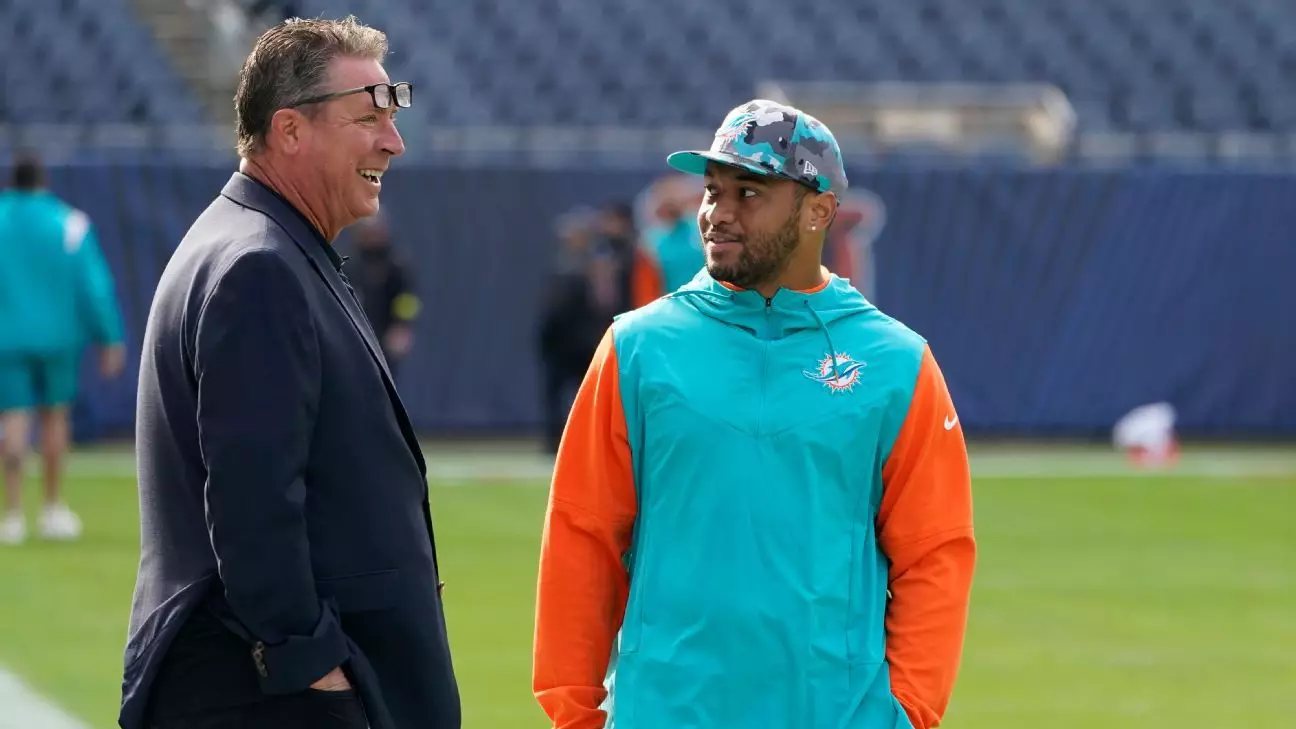The Miami Dolphins have made a monumental commitment to their quarterback, Tua Tagovailoa, by extending his contract for four years at a staggering $212.1 million. This clearly reflects the team’s determination to build around Tagovailoa as their cornerstone player. However, amid this financial support lies a more pressing concern—his health. As football enthusiasts everywhere eagerly await the new season, the Dolphins must prioritize ensuring the quarterback’s availability to maximize his potential for success.
Dan Marino, a Hall of Fame quarterback and now advisor to Dolphins owner Stephen Ross, recently lent his voice to the ongoing conversation about Tagovailoa’s future. In an appearance on “The Pat McAfee Show,” Marino acknowledged not only Tagovailoa’s undeniable talent but also the acute vulnerability the quarterback faces when injuries beckon. Marino’s candid commentary serves as both reassurance and a call to action: the Dolphins must devise strategies that fortify Tagovailoa against looming health risks.
News about Tagovailoa’s fluctuating health statuses has become the centerpiece of his career thus far. In 2024, he was sidelined for a career-high six games—an event that has raised eyebrows and concern. He missed most of these games due to serious concussions, and although he was cleared to play by season’s end, lingering injuries, including a hip pointer, underlined a trend that the Dolphins cannot ignore. Marino emphasized the team’s aspirations to qualify for the playoffs, asserting that keeping Tagovailoa on the field—especially during crunch time—is crucial.
While injured, Tagovailoa demonstrated remarkable ability on the turf, leading the NFL with an impressive 72.9% completion rate, amassing 2,867 yards, tossing 19 touchdowns, and surrendering only seven interceptions. Clearly, he is a force to be reckoned with when present. Yet, the paradox remains—his skill set can only be of value if it is not sidelined by injuries.
Evaluating Support from the Organization
Dolphins’ General Manager Chris Grier pointed out the essential need for Tagovailoa to hone his self-protective instincts to minimize injury risks. The repeated cycles of minor and major injuries raise questions about his longevity in the league. Grier’s insights reveal a broader organizational philosophy: while they trust Tagovailoa’s abilities on the field, they clearly desire a focus on risk mitigation. The overarching message is this: the Dolphins view their franchise quarterback as someone who can lead them to victory, but he must first learn how to safeguard himself—an imperative that resonates deeply with sports professionals and fans alike.
As football is notorious for its physical toll, Tagovailoa must strike a delicate balance between aggression and self-preservation. Grier’s remarks highlight a growing need for quarterbacks to understand their limitations, something that has not always been emphasized in training regimes historically. As such, Tagovailoa’s offseason should undoubtedly feature preparation focused not only on enhancing skill but also on prioritizing health to ensure he can sustain a full season.
Reflecting on his journey, Tagovailoa has indeed expressed frustration with his injury record. Compounding concussions—along with breaks to his ribs and fingers—have created a narrative where his potential remains tantalizingly out of reach. The athlete’s acknowledgment of these challenges does not merely demonstrate his accountability; it reveals an honest contemplation within the larger framework of the sport. As Tagovailoa reviews his past injuries and the subsequent games lost, he recognizes the impact it has on both his career trajectory and the team’s aspirations.
Going forward, it is absolutely crucial for both Tagovailoa and the Dolphins to view this phase not just as a period of challenges, but as an opportunity to strengthen their bond and build a formidable team. With Marino’s guidance and support from the organization, there lies a potential for growth—a realization that every quarterback must navigate a path littered with potential pitfalls.
For Tagovailoa, the essence of football lies not just in throwing touchdowns but in maintaining his health to propel the Dolphins back into playoff contention. Both the player and the franchise have a shared responsibility to adapt, learn, and grow. If successful, Tagovailoa’s journey could redefine not only his career but potentially elevate the Dolphins back to prominence in the NFL landscape.

